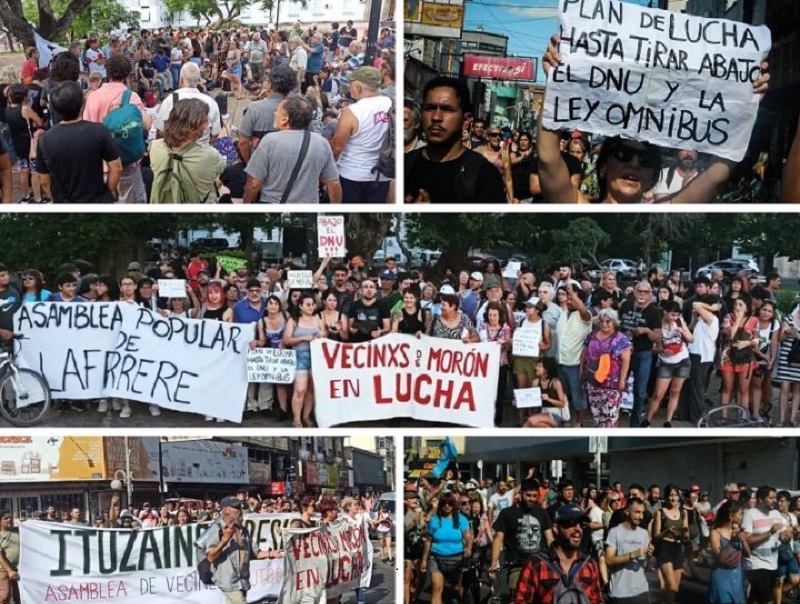
The government of Javier Milei launched a war plan against the great majorities in favor of concentrated sectors of economic power. The economic measures of Luis Caputo, then the DNU, the repressive “protocol” of Bullrich, and later the Omnibus Law, are the basis of discussion in each assembly that emerged on December 20, and that extend to multiple cities and municipalities , where workers, precarious young people, self-employed people, professionals, students, women and retirees, etc. participate. They meet weekly. They are organized through WhatsApp groups, many of them have their own social networks on Instagram and TikTok.
From the first cacerolazos of December, the demands to the union centers were heard: “unity of the workers and those who don’t like it are screwed”, “where is that famous CGT that cannot be seen?”, “unemployment, strike, national strike” and “set the date.”
In different cities and municipalities, coordination arises between assemblies to debate and strengthen the perspective of a fight plan until the government measures fall.
In the City of Buenos Aires, this Wednesday they met at Ademys (Buenos Aires teaching union) representatives of recovered unions, combative unionism, picketing organizations, popular assemblies, student centers, activists from Unidxs por la Cultura and all left-wing organizations. They resolved to massively promote the general strike, the mobilization and the cacerolazo of the 24th, as well as to organize an independent column that demands the continuity of a plan of struggle. On Tuesday the 23rd at 1:30 p.m. in Congress they will hold the unitary press conference.
United for Culture
A movement of cultural workers also emerged that organized a cultural cacerolazo on January 10 in 80 cities in the country.
For this Saturday, January 20, they are preparing another day of demonstrations in different parts of the country. In the City of Buenos Aires, cultural workers call to gather in front of the National Congress. The objective of the call is to arrive prepared for the national strike and vote on the continuity of their fight plan.
Furthermore, this movement United for culture, issued a statement against the deputies who are preparing to vote in Congress in favor of the government. “We demand the end of the secret negotiations between the blocks of the UCR, the PRO and We Make the Federal Coalition with the government. We demand that the debate be carried out in front of the population. Those who vote in favor of the DNU and the Omnibus Law are going to be complicit in the greatest looting and concentration of power that has ever been attempted in the history of our country. The people will not forget them, culture will ensure that they do not forget them.”
Buenos aires city
Dozens of assemblies, noises, bangs of pots and, in some cases, street blockades are taking place in different parts of the City by those who took the lead to confront Mieli’s DNU, the Omnibus Law and the Bullrich Protocol. These spaces discuss participation in the 24E mobilization.
Total cut on Av Rivadavia and Medrano along with the assemblies of Plaza Almagro, Medrano and Rivadavia and Boedo. General strike and fight plan until we tear down the DNU, the Omnibus Law and the repressive protocol!! pic.twitter.com/Mrk7qZVLs8
— Florencia Saracho (@fsaracho2014) January 18, 2024
Week by week the call grows and new Assemblies are set up. You can find them in Plaza Almagro, Plaza 1ª de Mayo, Lugano, Flores, Parque Chacabuco, Acoyte and Rivadavia, among many other points where they are voting for actions to arrive organized at the national strike. For example, in the Patricios Park voted to hold a cultural festival this Sunday, January 21 with the aim of adding more strength to the mobilization on 24E. They call on all residents of the neighborhood to participate. It is an instance where precarious youth, who have no possibility of organizing in their workplace, find a space where they can speak and vote on a plan of struggle.
In the mouth, workers, students, artists from the mythical neighborhood of Quinquela Martín, cartoneras, those who support cafeterias and cultural spaces, and from different social and political organizations, debate the serious situation that exists in the country, how the crisis impacts the neighborhood and What measures to take as an assembly. They voted to march alongside the assemblies of the Capital and Greater Buenos Aires independently, with their flag: “Self-convened neighbors of La Boca: Down with the DNU, the Omnibus Law and the Protocol. Fight Plan Now.”
Buenos Aires suburbs
In several areas of the suburbs, assemblies emerged on December 20, after the mobilization of the left and combative sectors.
In the western zone, protest actions are replicated in each municipality as Merlo, Hurlingham, Morón, and in the towns of Ramos Mejía, Laferrere and Ciudad Evita de La Matanza, among others. Neighbors who are teachers, state workers, cultural workers, health workers, railway workers, professionals, retirees, small business owners, environmentalists, feminists and also young students, precarious and unemployed, among others, participate.
From cacerolazos and popular assemblies to coordination: More than ten popular assemblies met in Morón with delegates who were democratically voted in each of them. They exchanged their organizational experiences where they vote on resolutions. Among them actively participating in the national strike. The railway workers proposed a “train” to Eleven to facilitate mobilization and workers at the Posadas Hospital, to promote a pot-banging at the door of the hospital on the 24th in defense of health. In addition, they decided to continue with coordination, even after the strike.
Cacerolazos and assemblies in the South Zone
In a new week of struggle and organization throughout the country, in the south of the Conurbano, the assemblies went out to pot, mobilized and defined actions in the face of the strike on the 24th. They were convened in Quilmes, Monte Grande, Cañuelas, Berazategui, Glew, Claypole, Burzaco, Ezeiza, Lanús, Varela and an assembly that will nuclear those of Almirante Brown.
Popular assembly in San Miguel
More than 300 people at the Cultural Festival against the DNU and the Omnibus Law promoted by artists, working neighbors, young people and students in the area to organize in the face of the strike on the 24th.
The popular assembly of Pacheco met around 24E
The Pacheco popular assembly convened by the Suteba Tigre met with 150 people after a first coordination meeting. Workers, social, neighborhood and political organizations, together with members of popular libraries and residents of the Delta, debated how to organize to face Milei’s Chainsaw Plan.
Buenos Aires province
City of La Plata
Different sectors met in an assembly to prepare for participation in the strike on the 24th. At 7 and 50 (Platense center) state and health workers, students, organized tenants, artists and cultural workers, family members of people with disabilities, among other neighbors, They met again in an assembly to debate how to continue the organization they have been supporting, and participation in the 24E strike.
The assembly also had the participation of various social and political organizations that are part of the space that promotes the mobilization of 24, a pole independent of bureaucratic union leadership.
White Bay
The last week witnessed how the fight against the Milei government’s announcements advances in the south of the province of Buenos Aires: Bahía Blanca, Tres Arroyos, Coronel Rosales and Dorrego with different initiatives are organized to participate strongly in the next strike on 24E.
The Bahía Blanca open assembly is brought together by a dozen social, union and political organizations. Workers from local culture, education and health participate in it. Researchers from Conicet and representatives of the women’s and diversities movement also participate. In the cacerolazos and mobilizations, retirees, secondary students, tertiary arts students and university students (UNS) have expressed themselves.
Jujuy
In the north of the country they are also organizing against Milei’s plan. In an assembly of more than 200 people, workers, employed and unemployed, indigenous communities and students, they voted on a series of proposals and measures regarding the 24E strike. No negotiation! General strike and fight plan until the DNU and the Omnibus Law fall. They are part of the slogans they raise.
In Abra Pampa and Humahuaca, meetings were held with fighters against the Reform to discuss the consequences of the DNU and the Omnibus Law on the rights of indigenous communities, territories and water, as well as of working people. Representative Natalia Morales and councilors from the PTS FIT were present.
Tucuman
In Tucumán, the strike mobilization will have the Government House as its epicenter. The social and political organizations gathered in the Memory, Truth and Justice Meeting call to mobilize from 10 a.m. in Plaza Urquiza. Towards the strike, they also call to mobilize sectors that have been organizing in assemblies such as artists and cultural workers, members of CONICET and mental health workers.
Black river
Students, teachers, artists, workers and unions from different sectors of Fiske Menuco expressed the implications of the DNU and the Omnibus Law. They called to reject them in the streets on January 24 in the general strike called by the union centers throughout the country.
Neuquen
A plenary session of union and social organizations called for a march in Neuquén and met at the UPCN headquarters. The majority of public and private unions, social organizations, the Mapuche Confederation and the Multisectorial de Neuquén participated, meeting to call for a united march within the framework of the national strike against the Milei plan.
The PTS in the Left Front participates in these organizing instances in the neighborhoods, which, together with the assemblies that are taking place in workplaces and places of study, is a great support point for the strike to be active. This fight does not end on 24E, it must continue until Milei’s war plan falls so that the crisis is paid for by big businessmen.
Source: www.laizquierdadiario.com

